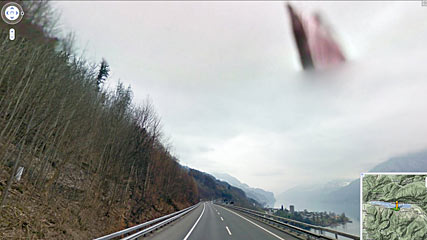Like pretty much everything else, God can be found on Google. And this week, with the help of Google Street View, you don’t even have to search for images of the Divine to find you.
This image, captured by the Street View feature of ubiquitous searcher (a fact about Google which may hint at the search engine itself is increasingly God-like, if not actually God) has been interpreted by thousands as a glimpse of God captured on camera. Of course others have suggested that it is more likely bird poop on the camera lens. Whatever it is, there is a lesson here in when and why we see/think we see God.

It comes down to admitting that we all find the God or no-God for which we are looking. There is proof of either the existence or the non-existence of God. Their constant debating to the contrary, that is something upon which both deep believers and ardent atheists ought to agree.
When believers in the infinite insist that there are scientific proofs for the existence of the God in whom they believe, they are reducing the object of their faith to something whose existence can also be disproved. Is that really what they want? Is the God in whom they believe really so small as to be disproved? Maybe, but that’s no god worthy of one’s faith.
When non-believers assert that they can prove the non-existence of God, they are having an argument which is irrelevant to real believers – one which is, by definition, meaningless to those who believe. So to what purpose do they keep re-proving the non-existence of God? Are they simply doing it as a ritual demonstration of the conclusions which they have already reached? If so, the joke is on them – they have created rituals and liturgy for the no-God community which directly parallels those of the God folks!
Both sides would be forced to admit that there is significant evidence to support the views held by the other side and each would have to take responsibility not only for the beauty and goodness achieved by holding their respective beliefs, but also for the incredible harm which has been done by those same beliefs and dis-beliefs. What we ultimately decide, says more about who we are than it does about anything else. And as long as the decision reached actually makes the world better and safer, even for those who don’t share our conclusions, it would make it the right conclusion for us.
Instead of each side engaging in a debate whose real purpose is to keep each side from asking any questions about its own views, by focusing on demolishing those of others, I would suggest a new approach to this debate. Let each side stop talking about proofs and dis-proofs and speak instead about the results of belief and disbelief in their own lives and our assessment of the impact of God in the world in which we live. For pretty much all of us, it is those experiences which govern our conclusion.
Like those who interpret the image from Google Street View, some of whom see God and some of whom see bird poop, when it comes to God, we tend to see what we believe, not believe what we see.
